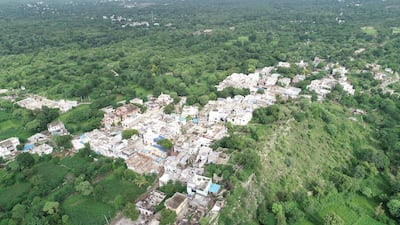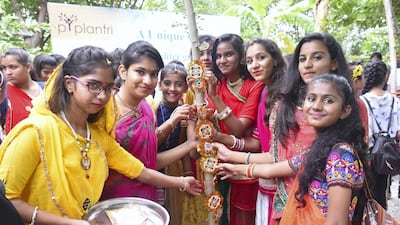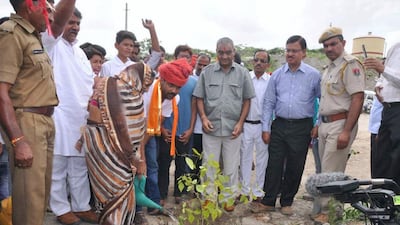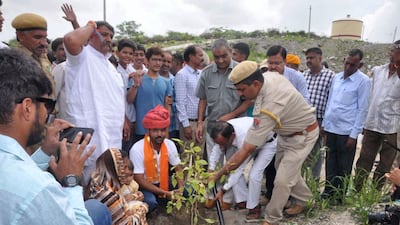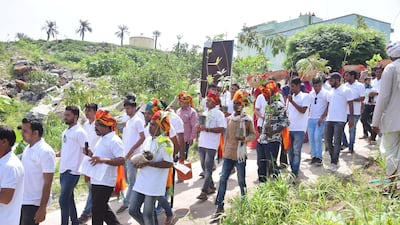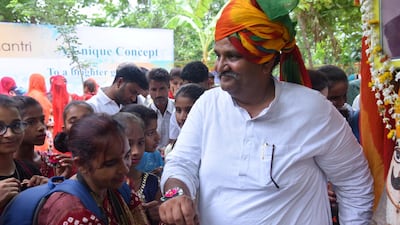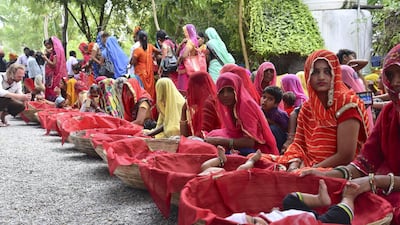In the Indian desert state of Rajasthan, a village has been turned into a lush, green oasis to celebrate the births of hundreds of girls.
The verdant landscape and the villagers' attitudes stand out in a largely patriarchal country where millions of female foetuses are killed.
"We plant 111 trees to celebrate the birth of each girl in the village since 2007," said Shyam Sunder Paliwal, the former head of Piplantri village in western India.
"It was a barren land but now there are more than 86,000 trees dedicated to girls.”
Piplantri is a bright spot in the world's second-most populous country, which is struggling with a skewed sex ratio because of parents’ preference for boys.
The phenomenon has led to a dip in the number of women and girls, at 940 to every 1,000 men and boys, the 2011 census said.
Rajasthan is a particularly acute example of the practice, with only 928 females to each 1,000 males.
Daughters have historically been discriminated against in Indian society under the belief that they are inferior to sons.
Male children are considered the true heirs to the family name, who will provide succour to their ageing parents.
Many other families consider daughters a financial burden and deny them freedom and education, and in many cases marry them off with crippling dowries at an early age.
A Ministry of Finance report released last year found 63 million girls were "statistically missing" from India's population and 21 million more were "unwanted" because of illegal sex-selective abortions.
British medical journal The Lancet, on the eve of the country's last census, said that about 12 million female children were illegally aborted in three decades, despite successive governments bringing stringent laws to end the practice.
Prime Minister Narendra Modi launched a programme to try to turn the siyuation around in 2014.
"We do not have the right to kill the girl child," Mr Modi said at the launch of his Save Girl, Educate Girl programme in northern Haryana state, one of the worst performers on gender imbalance, with 879 women and girls to every 1,000 men and boys.
But recent trends have painted a grim picture of growing gender discrimination, with cases of female infanticide frequently reported across India.
An eight-day-old girl was rescued in northern Uttar Pradesh state from a crematorium where she was buried in a pot in October.
And police are investigating the parents of a 15-day-old girl who was allegedly murdered because of her gender.
Turning the tide
Mr Paliwal’s personal tragedy shaped the fate of the nearly 800 girls born in the 5,500 household Piplantri village since 2007.
Mr Paliwal, 52, lost his daughter Kiran, 16, to a disease in 2007, leading him to plant a burflower tree in her memory and eventually begin his campaign for the protection of girls.
"I was heartbroken after her death," he said. "She meant everything to me. After she was gone, I couldn’t understand how people could kill their daughters.
"Many parents used to get upset over the birth of a daughter so I convinced villagers to plant trees. I told them they are as strong as these trees and will provide solace in our old age."
Each girl in the village is entitled to claim the equivalent of Dh2,100 on turning 18, the legal age for marriage or to begin higher education.
A quarter of this amount is donated by the girl's parents and the rest raised from other villagers and donations.
"There were hardly any girls for men to marry here but in the next decade we will have a perfect balance," Mr Paliwal said.
He said the campaign helped girls to regain their place in society.
Santosh Paliwal said that because of the villagers' support, she felt proud to raise her daughter, who was born in 2017.
Many women are still scorned or abandoned by their husbands for giving birth to daughters, and thousands of women are murdered over dowries.
"When my daughter was born, I was apprehensive that the villagers would feel pity on me," Ms Paliwal said. "I was scared that they would humiliate me for giving birth to a girl.
"But they did not. They were very happy. As a mother of a girl, I believe that daughters are no less than sons and we should give them the opportunity to live and study."
Piplantri villagers have won accolades from authorities, including Mr Modi, but experts say it will be a long battle to change the perception of the larger society.
Activist Rajen Chaudhary has earned the nickname “friend of unborn” in Rajasthan for closing down illegal abortion clinics.
"These beliefs are deep-seated in the society and will need time and patience to change,” Mr Chaudhary said.
"There is a popular belief that girls should be born but not in our homes, because they are seen as a financial and safety burden."
Over the decades federal governments have launched ambitious projects for protecting girls, including a law in 1994 that banned sex-selective abortions.
Mr Modi's programme has cost $89m (Dh326.8m), with more than half of that spent on promoting the project, which activists say has not changed much.
"While the focus of these programs are largely around campaigning, the money is spent on advertisements," said Alka Singh of Save the Children.
"Awareness is needed but looking at the status of women, only awareness or sensitisation by itself won’t help.
"There is a need to ensure strict enforcement of laws and punishment for crimes such as rapes and dowry, which are the two main reasons for female infanticide.”
